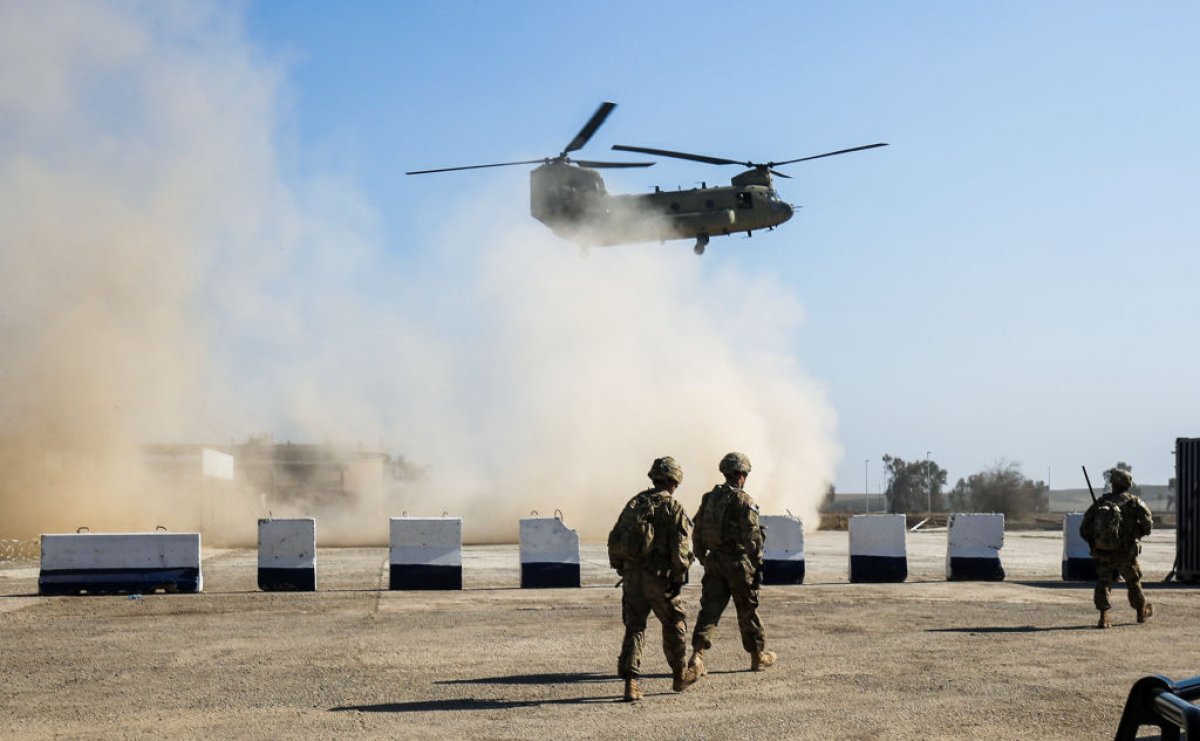For most people, the dawn of a new year is filled with hope and anticipation about possibilities in the months ahead. For U.S. troops still stationed in Iraq, however, the first several days of 2022 is looking a lot like 2021—with hostile fire bearing down at a moment's notice.
In the first five days of this new year, there have already been three separate attacks against U.S. forces in Iraq. The first, on Jan. 3, involved two fixed-wing "suicide drones" of unknown origin targeting the Diplomatic Support Center. The C-RAM air defense system that protects this facility, where U.S. military advisers are based, was activated immediately, shooting down the drones before they could reach impact.
The second attack, on Jan. 4, took place about 140 miles to the northwest, where two more fixed-wing drones carrying explosives approached the Ain al-Asad airbase in Anbar Province. Yet again, the drones were obliterated before they could reach their target. The next day, Jan 5, five rockets landed near the same base. U.S. troops tasked with training and advising Iraqi security forces were able to escape all of these incidents without any casualties That's the good news.
The bad news: These kinds of attacks are almost certain to continue throughout the year and for as long as the U.S. military remains stationed in Iraq. The fact that both attacks could be retaliation for the U.S. killing Iranian General Qassem Soleimani in 2020 provides little comfort when the pace of these operations shows no sign of slowing anytime soon. To expect the hostile rockets and drones to magically stop or taper off once the remembrances of Soleimani occur is to engage in wishful (and dangerous) thinking. Until U.S. policymakers in Washington reach the point when a decision to withdraw all troops from Iraq is actually made, the Shiite militias that now rival the official Iraqi army as a fighting force will remain intent on doing what they can to drive the U.S. out of Iraq.
The 2,500 U.S. forces in the country find themselves in a situation where their mere presence fuels the types of asymmetric operations we are currently seeing. Even before this week's incidents, attacks against U.S. positions on Iraqi military bases were becoming regular. According to the Defense Intelligence Agency, there were more than 300 attacks against U.S. forces in Iraq between the end of 2019 and the spring of 2021, resulting in four U.S. fatalities and 25 injuries. As one might expect, the U.S. retaliated to some of those strikes, like when U.S. Air Force jets bombed Shiite militia weapons facilities on both sides of the Iraq-Syria border last June. The Pentagon at the time insisted those operations would send an "unambiguous deterrent message" to the groups involved: If you target Americans, you will suffer the consequences.
As U.S. officials have discovered, however, it's extremely difficult to deter a non-state organization. The reason: Unlike a state, which has to account for a multitude of concerns like ensuring control over the sovereign, non-state organizations don't have to worry about losing formal power. Their incentive to do what we want them to do is degraded. We can see this most clearly in Iraq; despite several U.S. airstrikes against Shiite militia outposts under Presidents Donald Trump and Joe Biden, those very same militias continue to conduct operations against U.S. forces as if those strikes didn't even occur.

If there was a core U.S. security objective that required the U.S. military to be in Iraq over an indefinite period of time, perhaps U.S. officials could rationalize all of this. Yet this is hardly the case in Iraq and Syria. The mission U.S. troops sought to accomplish in both countries, destroying the Islamic State's territorial caliphate, has been accomplished.
ISIS can still conduct low-grade operations and the occasional artillery attack against Syrian and Iraqi positions, but striking exposed and poorly-trained troops isn't exactly an indication of resilience or success. These days, ISIS spends most of its time simply surviving than it does planning and executing attacks. And because the group no longer controls any territory, it doesn't have access to the money-making schemes (like taxing the millions of people who at one time lived under its writ) that filled the group's coffers.
ISIS is also dealing with a kaleidoscope of enemies at the same time, all of whom have no interest whatsoever in allowing the terrorist group to rebound. Russia, the Syrian government, the Syrian Democratic Forces, Turkey and Iraq are all conducting missions against the group in one way or another, whether it's airstrikes on fighters in the Syrian desert or widespread arrests of ISIS facilitators on Turkish soil.
This isn't to downplay ISIS or its capabilities. The group is still a legitimate threat, particularly to governments in the region.
All of this, however, merely provides stakeholders in the Middle East with more incentive to keep the pressure on ISIS.
As far as the United States military is concerned, the men and women in uniform have done their job. It's time to acknowledge success and bring them home. Or, as Dan Caldwell, the vice president of foreign policy at Stand Together, a veteran of the U.S. Marine Corps who served in Iraq, told me, "If you don't want troops under fire in Iraq, withdraw them instead of pretending they aren't on a combat mission."
Daniel R. DePetris is a fellow at Defense Priorities and a foreign affairs columnist at Newsweek.
The views expressed in this article are the writer's own.
Uncommon Knowledge
Newsweek is committed to challenging conventional wisdom and finding connections in the search for common ground.
Newsweek is committed to challenging conventional wisdom and finding connections in the search for common ground.
About the writer
To read how Newsweek uses AI as a newsroom tool, Click here.








